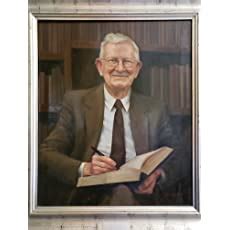A Quote by Carl Sagan
My deeply held belief is that if a god of anything like the traditional sort exists, our curiosity and intelligence is provided by such a God. We would be unappreciative of that gift if we suppressed our passion to explore the universe and ourselves.
Related Quotes
My deeply held belief is that if a god of anything like the traditional sort exists, our curiosity and intelligence are provided by such a god. We would be unappreciative of those gifts (as well as unable to take such a course of action) if we suppressed our passion to explore the universe and ourselves. On the other hand, if such a traditional god does not exist, our curiosity and our intelligence are the essential tools for managing our survival. In either case, the enterprise of knowledge is consistent with both science and religion, and is essential for the welfare of the human species.
Everything that we think God has in his mind necessarily proceeds from our own mind; it is what we imagine to be in God's mind, and it is really difficult for human intelligence to guess at a divine intelligence. What we usually end up with by this sort of reasoning is to make God the color-sergeant of our army and to make Him as chauvinistic as ourselves.
You can refer to god and you are really just talking about nature. If you are going to say the universe is god, then everything is god, everything is religion. But when we explore traditional religion we are talking about humanistic gods people pray to, that they think can intervene in our lives, who run sort of a heaven-and-hell operation for the afterworld.
Man depends on God for all things: God depends on man for one. Without man's love God does not exist as God, only as creator, and love is the one thing no one, not even God himself, can command. It is a free gift or it is nothing. And it is most itself, most free, when it is offered in spite of suffering, of injustice, and of death . . . The justification of the injustice of the universe is not our blind acceptance of God's inexplicable will, nor our trust in God's love, his dark and incomprehensible love, for us, but our human love, notwithstanding anything, for him.
Our time on earth and our energy, intelligence, opportunities, relationships, and resources are all gifts from God that he has entrusted to our care and management. We are stewards of whatever God gives us. This concept of stewardship begins with the recognition that God is the owner of everything and everyone on earth. ... We never actually own anything during our brief stay on earth. God just loans the earth to us while we're here. It was God's property before you arrived, and God will loan it to someone else after you die.
As we explore the nature of our gift, our goal is to move toward this kind of giving: cheerful giving that flows gently and easily, kingly giving that flows surely from who we are. As we encounter the questions—Who are we ? What do we love ?—the gift we bring will be easy, because our gift naturally emerges from who we are. The offering we bring is ourselves, just as we are. Our gift is our true nature. There can be no greater gift than this.
Spirituality emerged as a fundamental guidepost in Wholeheartedness. Not religiosity but the deeply held belief that we are inextricably connected to one another by a force greater than ourselves--a force grounded in love and compassion. For some of us that's God, for others it's nature, art, or even human soulfulness. I believe that owning our worthiness is the act of acknowledging that we are sacred. Perhaps embracing vulnerability and overcoming numbing is ultimately about the care and feeding of our spirits.
Our mistake is that we want God to send revival on our terms. We want to get the power of God into our hands, to call it to us that it may work for us in promoting and furthering our kind of Christianity. We want still to be in charge, guiding the chariot through the religious sky in the direction we want it to go, shouting "Glory to God," but modestly accepting a share of the glory for ourselves in a nice inoffensive sort of way. We are calling on God to send fire on our altars, completely ignoring the fact that they are OUR altars and not God's.
Consequently, the truth of God lives in our souls more by the power of superior moral courage than by the light of an eminent intelligence. Indeed, spiritual intelligence itself depends on the fortitude and patience with which we sacrifice ourselves for the truth, as it is communicated to our lives concretely in the providential will of God
If God's people hunger deeply enough, God will hear and send revival. God requires more than casual prayers for revival. He wants His people to hunger and thirst for His mighty working. To seek God's face is far more than occasionally mentioning revival in our prayer. It involves repeated and prolonged prayer. It requires holy determination in prayer, examining ourselves to see if anything in our lives is hindering God.


































